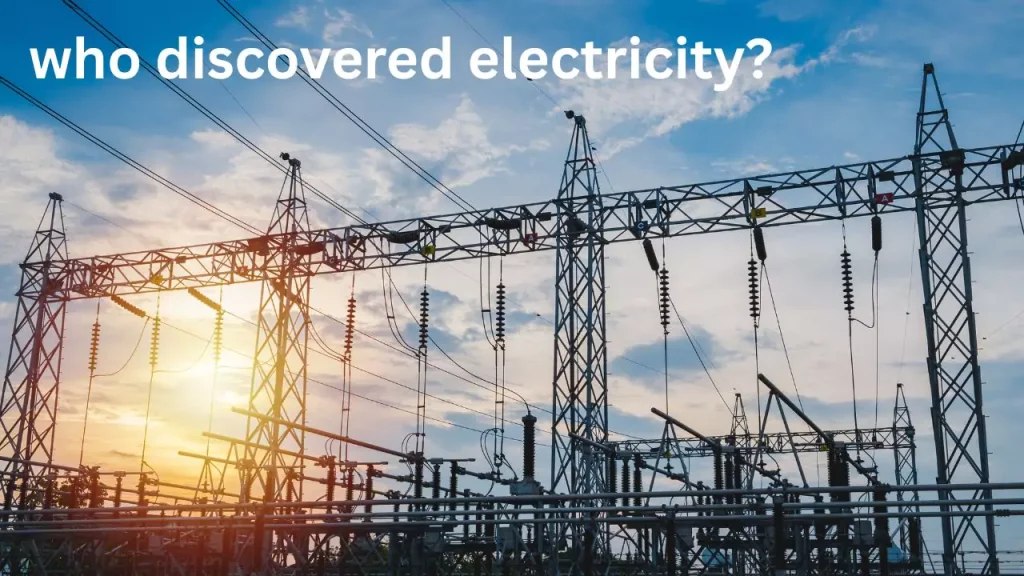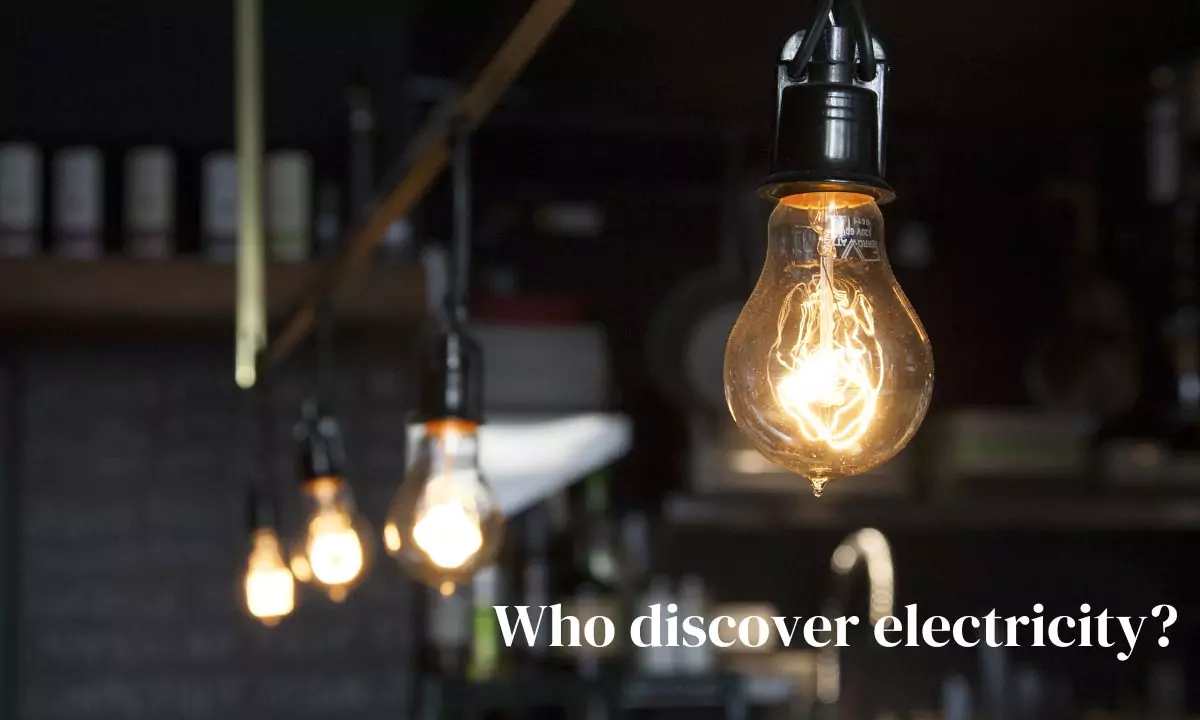Who Discovered Electricity?
Table of Contents
Introduction
Who discovered electricity? It is an inquisitive question, but also, perhaps, one of the most inclusive and transformational events that have ever taken place. Electricity runs into our homes, our technology, and powers the machines that contribute to our post-modern world. To gain an appreciation of the nature of the discovery of electricity, which was predicated on observing certain phenomena applied by observations made by a sequence of events over the past several centuries, it is appropriate to examine how we came to be in the modern electrical age from where we first began our inquisition. It is clear that centuries of observations; experience, and numerous discoveries made by various intellectual minds have taken us a long way towards understanding the combustion of electrical phenomena. This historic overview of the electrical phenomenon hopes to develop the story of its discoverer through detailing its initial origins and the progress of a few notable discoverers and their significant contributions.
Early Discoveries and Insights
The discovery of electricity dates back to ancient observers of static electricity. Beginning around 600 BC with Thales of Miletus, a Greek philosopher, we have the earliest observations. By rubbing amber with a cloth, he demonstrated that amber could attract small objects, such as feathers or dust. This phenomenon, now referred to as static electricity, was one of humankind’s first recorded observations of electrical behavior. Although early Greeks could not yet think of electricity the way we do today, their inquisitive nature and insights were full of potential that would unfold over time.
who discovered electricity? In this line the word “electricity” has its etymological roots in the early observation that the Greeks made when they first observed amber. The word ‘”electricity,” is derived from the Greek word “electron,” which means amber. From these early observations, and discoveries, very little substantive progress toward understanding electricity occurred for centuries.
The Renaissance and The Emergence of Electricity Science
The Renaissance was a time of renewed importance in the world of science and discovery, and provided an atmosphere in which natural phenomena could be examined in a more rational and systematic manner. In the late 16th century, William Gilbert, an English natural philosopher and physician, made significant contributions to the study of electricity. He is often called the father of electricity science, for his foundational work. Gilbert coined the term “electricity” to identify the physical property of attracting small objects after having been in contact with them, or what we now refer to as static electricity.
William Gilbert played an important role in answering the question: Who discovered electricity? His work, De Magnete, published in 1600, distinguished magnetism from static electricity, allowing for a sound basis of electricity to evolve from his framework. Much of the world thinks of amber when we talk about early experiments with electricity, yet Gilbert recognized that materials such as sulfur and glass exhibited electrical properties when rubbed. It was Gilbert’s systematic, clearly classified, and rational logic and scientific terms that influenced electrical experimentation after him. When one thinks of who discovered electricity, Gilbert’s name is prominent because of his so-called pioneering methods. Gilbert will fairly be remembered as one of the first scientists to find a scientific foundation for electricity. For those wondering who discovered electricity, Gilbert’s writings remain an important part of that answer.

The Enlightenment and Benjamin Franklin
The Enlightenment was a time of growth in scientific investigation and experimentation, especially within Europe and North America. Benjamin Franklin, an American polymath, carried out some of the most famous experiments of the Enlightenment with electricity. Franklin’s interest in electricity led him to hypothesize that lightning was a type of electrical discharge.
In 1752, Franklin put his hypothesis to the test when he performed his kite experiment. Franklin flew a kite with a string attached to a key in a storm containing thunder and lightning, demonstrating that lightning was electrical. While Franklin’s kite experiment was dangerous and would likely still be considered dangerous by current standards, it existed as a significant piece of evidence connecting the phenomena of electricity and lightning. Franklin’s experiments helped develop an understanding of positive and negative electrical charge and contributed to a set of systematic studies in electricity.
Modern accounts of history often idolize Benjamin Franklin, and he is credited with more achievements than any one person can accomplish in their lifetime. He was not the discoverer of electricity for many decades, there were many individuals constructing similar electrical theories and models. Franklin did not originate the electrical model or that of current but advanced multiple ideas on what electricity was made from and excited the scientific community to study and understand electricity.
Alessandro Volta and the Electric Battery
As we explore the question, who discovered electricity? we would certainly think of Alessandro Volta. An Italian physicist, Volta was the first to make a major advancement in studying electricity by inventing the first chemical battery in 1800. His invention, which contained a series stacks of zinc and copper disks, was called the voltaic pile, and the disks were separated with pieces of cardboard soaked in salt water.
The voltaic pile was a revolutionary invention because now there was a reliable and steady source of electric current instead of relying on static electricity, which was limited in experimentation. The ability to send a steady flow of electric current meant new scientific experiments could be conducted, which underwent new discoveries and created innovations. Volta’s work directly informed scientists, influence their research, and laid foundation for electrochemistry. In terms of electricity discoverers, Volta’s battery was a valuable milestone because it not only provided more control over electrical energy, but it provided a way to reliably generate electricity.
Michael Faraday and Electromagnetism
Further addressing the question who discovered electricity is another crucial contributor, Michael Faraday. Faraday was an English scientist, and is known for many achievements that have fundamental roles in electromagnetism. In the early 19th century, Faraday revealed the principals of electromagnetic induction through his various experiments, these principals are the basis for the operation of electric generators and transformers. In 1831 Faraday showed that a coil of wire produced a constant current of 100 ohms.
Thomas Edison and Practical Usage
As the discovery of the science of electricity developed, another important chapter in the history of electricity inventors was also taking place, one that involved electricity’s practical utilization. One of the key players was America’s own Thomas Edison. Edison’s most significant contribution was to the incandescent light bulb which changed both the practical usage of electricity and the public’s perception of electricity.
Edison developed a practical electric light bulb in 1879 that also lasted a long period of time compared to previous designs. When Edison invented the long lasting electric light bulb it had a tremendous impact on society as now electric lighting was useful and practical for use in homes and businesses. As well, Edison did not just invent the light bulb, he also created the first electric power distribution system that powered homes and industry with electricity.
Edison’s contributions to the invention of the electric light bulb and the electric power distribution system were essential to the commercialization of electricity and the acceptance of electricity as a valuable commodity. Edison is very much an embodiment of electricity’s transition from science to practical usage, introducing electricity from a novelty use into the fabric of society and everyday life. While Edison did not invent electricity and certainly did not invent the light bulb, his inventions and commercialized packages of inventions brought electricity into the mainstream. Edison’s contributions to these inventions paved the way for a period of experimenting with the extraordinary, seeing the practical potential of electricity as a utility.
The Collaborative Nature of Discovery
When you are wondering who discovered electricity, the answer is not limited to one name, but many great minds, over hundreds of years of time. The discovery of electricity began with the early observations of static electricity by the ancient Greeks. The studies of electricity moved on from there, to William Gilbert’s studies, and to Benjamin Franklin, and then to Alessandro Volta’s invention of the electric battery. Then, luminaries such as Michael Faraday’s discovery of electromagnetic induction led to Thomas Edison’s many practical inventions that fundamentally changed the way we are able to utilize electricity in everyday events. So if you are wondering who discovered electricity it is important to recognize that it is a collective legacy. Each of these scientists has contributed to the development of what we currently refer to as electrical science. The phrase “who discovered electricity” signifies the story of scientists working together and innovating together.
There is no easy answer to the question of Who discovered electricity because it is a product of incremental science and collaboration. Every scientist made discoveries that built on the work of their predecessors, allowing knowledge and technology to evolve incrementally. The progression of electricity as a phenomenon exemplifies this important hallmark of science: the ideas of scientists are built and expanded upon, and are subjected through series of filtration like an experiment; scientists share their findings, others replicate those findings, and then science is not static; each scientist is either enhancing or detracting in their build and filtration process as they continue to wonder, and allow their findings to evolve.
Conclusion
Who discovered electricity? The answer is an intricate one with many scientists who have uniquely contributed to the discovery and understanding of electricity throughout history. The discovery and understanding of electricity has woven a tapestry of curiosity and ingenuity of the ancient philosophers, a systematic study of early modern scientists, and the [exploratory] experiments and inventions of electricity’s founders in the 18th and 19th centuries. From the account of Thales of Miletus to the founder of static electricity, William Gilbert, the audacious experiments of Benjamin Franklin, Alessandro Volta’ invention of the battery, the discovery of electromagnetic induction by Michael Faraday, and thw actual inventions by Thomas Edison, there have been many pioneers in the history of electricity. Our dive into the history of the people who discovered electricity, pays respect for all of these extraordinary thinkers, and further embodies the tremendous linkage which their discoveries have created for the technology and benefits we take for granted in modern society.
FAQs – Who Discovered Electricity?
1. Who was the first person in history to discover electricity?
When it comes to asking who discovered electricity, the earliest known observations can be traced back to Thales of Miletus in about 600 BC, he observed static electricity by rubbing amber with cloth.
2. Why is William Gilbert mentioned when discussing who discovered electricity?
William Gilbert is most often referenced when thinking about who discovered electricity because he coined the term electricity and for his experiments that separated electricity from magnetism in his book De Magnete in 1600. He established the scientific basis for future electrical research.
3. Did Benjamin Franklin discover electricity?
For many people who ask who discovered electricity, they think of Benjamin Franklin, but while he didn’t discover electricity, his kite experiment demonstrated that lightning can be a form of electrical energy, and helped contribute to understanding electricity as a whole.

